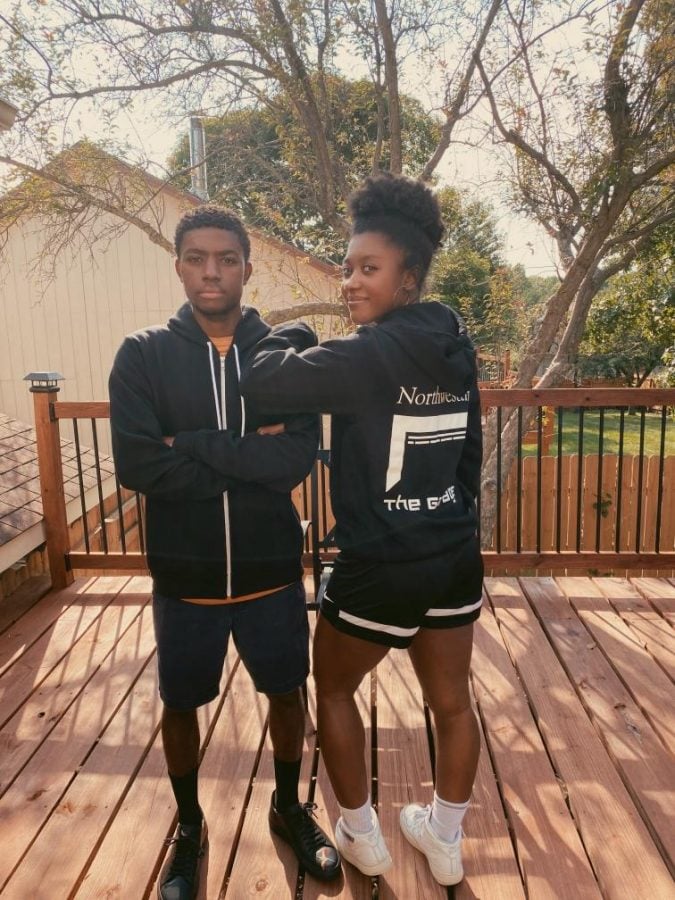Northwestern startup Project FILO aims to redefine media industry
Courtesy of Brandon Washington
Brandon (left) and his sister, Lauren Washington (right) founded Project FILO in 2017. FILO is set to launch early sometime next year.
November 11, 2020
Despite the illustrious nature of music entertainment, most artists signed to a record label get only a fraction of the riches their songs generate — below 20 percent. Communication junior Lauren Washington and her brother Brandon Washington want to flip that figure on its head.
Meet Project FILO, a media collective agency hoping to shake up the industry from top to bottom.
Co-founded in 2017 by Lauren and Brandon, FILO is a service catering to independent creators.
“Getting your work seen, first and foremost,” Brandon said, “that’s really what every artist and every creative wants.”
To this end, he said he hopes to do away with the royalty payments and long-lasting contracts traditional record labels employ. He said record labels and various other media organizations place profit before the needs of their represented artists.
FILO’s business model, he said, consists of a membership plan, much like a gym. If an artist chooses to opt for a more traditional contract-royalty plan, FILO would gladly negotiate their needs.
“The (modern-day record) label will dictate how, when and why an artist’s or a filmmaker’s creative work gets out,” Brandon said. “We want to have them retain their full ownership of their music or their work.”
For Brandon, FILO is an evolution of his first middle-school venture, NAGE, or New Age Golden Era, a media collective solely focused on music production. As he entered college, he said the remnants of NAGE grew into what FILO is today.
This summer, The Garage supported FILO through its Wildfire Pre-Accelerator program, granting FILO $10,000 and faculty resources during its incubation period.
As FILO began to grow, Brandon and Lauren expanded the bounds of its representation to include journalists, photographers, filmmakers and other artists.
Lauren, a filmmaker herself, said FILO aims to help young artists, working with all mediums, overcome barriers when breaking into the entertainment industry.
“Another thing that’s been helpful in this downtime is realizing what my role is in Project FILO as a co-founder and an artist,” Lauren said. “Not only is it the music industry, but the film industry is also heavily gatekept.”
Lauren plans to apply her entrepreneurship minor and experience in the film industry to FILO, where she said she hopes to curate and play an integral part in the film production process.
In general, FILO recruits artists on both the business and creative sides, which Brandon said is most evident in the group’s de facto creative tag: “for artists and by artists.”
Medill junior Ben Moskow produces a music review podcast titled “Real Ones” for FILO. He has used FILO’s connections to collaborate with underground artists and host his podcast, which is an example of what he said makes the collective so supportive. Moskow has never met Brandon in person, though he said they correspond about his podcasts and music in general. Moskow’s podcast cover art was even drawn up by a FILO member he had never seen before.
“It’s nice to see that everyone in FILO has been so supportive. I know a fair amount of people in the collective even if I’ve never met them in person,” Moskow said. “It’s a group of people who will support me and gas up my work.”
The structure of FILO, he said, should bring about a more “meritocratic” and financially stable business model for artists’ benefit.
Communication junior and filmmaker Kyra Brands said part of FILO’s appeal is that it serves as a creative outlet for budding filmmakers. As a part of its filmmaking team, she hopes to start new writers’ circles and programs to encourage other people to see through their personal projects with the support of others.
“It’s nice working with a group of people who are excited to work together. It makes it much more of an enjoyable process,” she said. “It also makes me want to work harder and keep thinking of different ideas.”
Brands said that she hopes to remain a contributor to FILO’s vision after she graduates from Northwestern.
As its ideation phase comes to a close, FILO is set to enter operations in early 2021. A senior at Rockhurst University, Brandon is set to graduate this spring and plans to continue growing FILO as his main job.
However, he said that FILO’s liftoff does not mean he wants to compromise on its idealistic vision for the arts scene at-large.
“We just want to really positively affect the local communities that we shape, first and foremost,” he said. “We hope the artists start to change their perceptions of how they can make it.”
Email: [email protected]
Twitter: @nick24francis
Related Stories:
— The Garage identifies personality traits of highly successful entrepreneurs in new study
— Shared prop closet to open in effort to increase accessibility for RTVF students
— Sastoque: What the pandemic means for the arts


